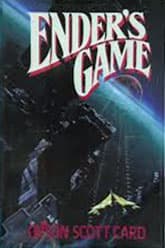Ender's Game
Critique • Quotes • At the movies
 First edition
First editionFirst publication
1985, United States
Literature form
Novel
Part of series
Ender's War (including Ender's Game and Speaker for the Dead) and the Ender series or Enderverse (1985–present)
Genre
Science fiction
Writing language
English
Author's country
United States
Length
Approx. 101,000 words
The endgame that spawned an endless series
When I first finished Ender's Game, before starting the second book in the series, I wondered what all the fuss was about. Oh, I enjoyed Ender's Game. It was a real scifi page-turner. But I did not feel good about my enjoyment.
Most of the novel concerns the training of a child, Andrew "Ender" Wiggin, to become leader of an expedition against an alien species, called the "buggers", which had previously attacked Earth. Ender is chosen because he is a boy genius who will resort to vicious violence if necessary to win a battle.
Watching him train and rise up through the ranks by defeating all challenges placed before him, I was reminded of Robert A. Heinlein's novel Starship Troopers in which young soldiers train for a mission against extraterrestrial "bugs". In both novels you get caught up rooting for the rising protagonists. In Heinlein's novel you're expected to accept a militaristic, arguably fascist, view of the world along the way. Card's novel heads in a similar direction, though along the way a few doubts are hinted at.
Then, in the last few chapters of Ender's Game, several surprises are sprung to change perspective on all that has gone before.
Still I was uneasy about it. The story up to that point had been exciting. I'd read eagerly, despite the two-dimensional characters and the implausible plot elements, such as having Ender's equally intelligent brother and sister politically manipulate the world while they are only adolescents. Ender himself leads military teams when he is only eight.
The geeks' revenge
In the 1991 introduction to the novel, Card responds to critics, who said gifted children do not act this way, by quoting gifted children who said he had indeed captured what it was like to be them. But, sorry, I'd be more impressed if he could cite brainy eleven-year olds who are actually running countries and conducting wars, not just dreaming about it.
As it is, most of Ender's Game takes place in what I think of as the "Revenge of the Nerds" vein of science fiction. This kind of plot lets geeky kids with science smarts fantasize about gaining superpowers or using their superior intellects to lord it over everyone else. My own inner-geek allows me to enjoy this kind of novel too, but my grownup brain says, wait a minute, it takes more than a child's technical knowledge to make one a brilliant politician or a master of battlefield psychology. Like, maybe, an understanding of human minds. Experience of social interactions. Emotional maturity. These kids however bright they are, confronted by real political operators and hardened military giants, would be squashed like...well, like bugs.
And then there were the queasy moral issues that the excitement of reading had led me to ignore. The revelations near the end of Ender's Game were interesting but too little and too late to make up for all that had come before.
So, an interesting novel but not a great one, I thought.
Then I started the sequel, Speaker for the Dead....
— Eric
Critique • Quotes • At the movies

